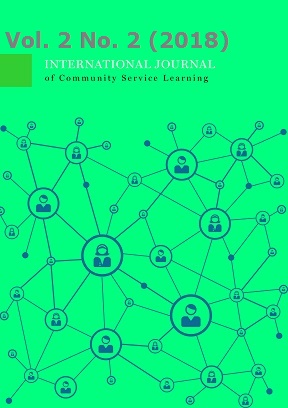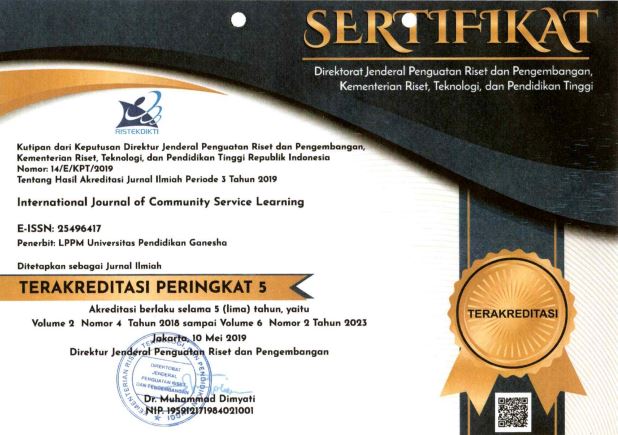Online Business Training To Teenagers "Shelter Rumah Hati " For Ex-Prisoners
DOI:
https://doi.org/10.23887/ijcsl.v2i2.14176Abstract
Community service team of Teachers Elementary School Education of PGRI University Madiun has conducted Online Business Training to Children and Youth Shelter Rumah Hati in Jombang. Shelter Rumah Hati is a place for ex-narapida children who have just come out of prisons and given mentoring there. The purpose of community service is: 1) To give knowledge about how to do business online to former inmates in Jombang House of the Heart, so they can open the job for themselves or others. 2) To provide assistance to children and adolescents who are in Shelter Rumah Hati Jombang. 3) To provide online-based skills to children and adolescents at Jombang Home Shelter. This training activity begins by meeting the shelter to seek permission to conduct online business training activities. We further deliver general material submissions on online business using lecture methods. After the delivery of materials, conducted activities of business practices online. After practice the way of our online business do mentoring process. The results of the training show that children and adolescents who are in Shelter Rumah Hati have a very high interest in online business, this can be seen from the questionnaire that we distributed to the children and adolescents there, they fill the satisfaction questionnaire with the value of the conversion of 87.8 means very good. Evaluation results related to the effectiveness of training also increased based on the N-Hake criteria with a value of 0.74 which means very good. Online Business Training at Jombang House Shelter in children and teenagers can be summed up that are interested and have the potential to open an online businessReferences
Ardila, F., & Herdiana, I. (2013). Penerimaan diri pada narapidana wanita. Jurnal psikologi kepribadian dan sosial, 2(1), 1-7.
Bauldry, S., Korom-Djakovic, D., McClanahan, W. S., McMaken, J., & Kotloff, L. J. (2009). Mentoring Formerly Incarcerated Adults: Insights from the Ready4Work Reentry Initiative. Field Report Series. Public/Private Ventures.
Bradley, K. H., Oliver, R. B., Richardson, N. C., & Slayter, E. M. (2001). No place like home: Housing and the ex-prisoner. Issue brief. Boston, MA: Community Resources for Justice.
Cameron, Brian H and Loreen Butcher-Powell, 2006 ,Gender differences among IT Profesionals in Dealing with Change and skill set Maintenance, Interdisciplinary Journal of Information, knowledge and Management Volume 1
Chornik, K. (2013). Music and Torture in Chilean Detention Centers: Conversations with an Ex-Agent of Pinochet's Secret Police. the world of music, 51-65.
Ciocchini, P. L. (2015). Killing (Life) Time: A study on the Experience of Time in Prision. Sortuz: Oñati Journal of Emergent Socio-Legal Studies, 4(1), 1-33.
Darmanto, 2009, ICT dan Perempuan Usaha Kecil, Asosiasi Pendamping Perempuan Usaha Kecil
Ekasari, A., & Susanti, N. D. (2009). Hubungan antara optimisme dan penyesuaian diri dengan stress pada narapidana kasus NAPZA di Lapas Kelas IIA Bulak Kapal Bekasi. SOUL, 2(2), 1-32.
Harsono, C. I. (1995). Sistem Baru Pembinaan Narapidana. Djambatan.
Esteban, F., Alós, R., Jódar, P., & Miguélez, F. (2014). ‘Ex-inmates’ Job Placement. A Qualitive Approach. Revista Española de Investigaciones Sociológicas, 145, 181-204.
Kaplan, C. A. (2006). U.S. Patent No. 7,155,157. Washington, DC: U.S. Patent and Trademark Office.
Martínez-Núñez, M., & Pérez-Aguiar, W. S. (2014). Efficiency analysis of information technology and online social networks management: An integrated DEA-model assessment. Information & Management, 51(6), 712-725.
Maruna, S., & LeBel, T. P. (2012). Revisiting ex-prisoner re-entry: A buzzword in search of a narrative. In Reform and punishment (pp. 170-192). Willan.
Nomor, K. M. K. R. I. M. 02-PK. 04.10 Tahun 1990 tentang Pola Pembinaan Narapidana. Tahanan Menteri Kehakiman Republik Indonesia.
Pradiantiwi, D., Safitri, R. W., & Prasasti, P. T. A. (2018). CHARACTER EDUCATION FOR PRISONERS SOFT SKILLS TO EMPOWER THROUGH ASINAN TRASI IN THE CORRECTIONAL INSTUTION NGAWI. Research Report.
Purkon, A. (2014). Bisnis online syariah. Gramedia Pustaka Utama.
Rakis, J. (2005). Improving the employment rate of ex-prisoners under parole. Fed. Probation, 69, 7.
Saragih, H., & Ramdhany, R. (2012). Pengaruh intensi pelanggan dalam berbelanja online kembali melalui media teknologi informasi forum jual beli (FJB) Kaskus. Jurnal Sistem Informasi, 8(2), 100-112.
Sepúlveda, M. A. (2004). Training in Microenterprise for imprisoned women. Cuadernos Unimetanos, (1), 33-40.
Shofia, F. (2009). Optimisme masa depan narapidana (Doctoral dissertation, Universitas Muhammadiyah Surakarta)
Suriano, G. (2011). Innovation, Lever For The Reeducation Process And Social Reintegration Of Adult And Juvenile Prisoners. Today's Children are Tomorrow's Parents, 29.
Van Dooren, K., Claudio, F., Kinner, S. A., & Williams, M. (2011). Beyond reintegration: a framework for understanding ex-prisoner health. International journal of prisoner health, 7(4), 26-36.
Downloads
Published
How to Cite
Issue
Section
License

International Journal of Comunnity Service Learning is licensed under a Creative Commons Attribution-ShareAlike 4.0 International License.













